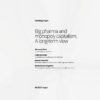This paper represents one of the first attempts at building a direct measure of occupational exposure to robotic labour-saving technologies. After identifying robotic and LS robotic patents retrieved by Montobbio et al. (2022), the underlying 4-digit CPC definitions are employed in order to detect functions and operations performed by technological artefacts which are more directed […]






